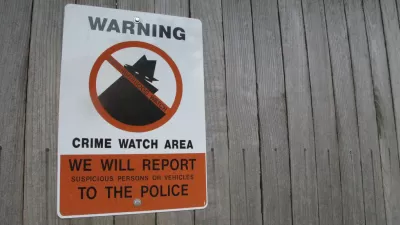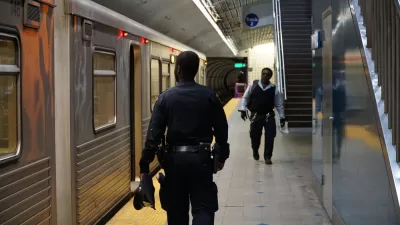A May Day march on Sunday that turned violent provided the opportunity for the Seattle Police Department to deploy its bike squad for crowd control, and in more ways than you might think.

You may have thought a bicycle's only use was transportation. The Seattle PD shows how well-suited the bicycle is for crowd control in more ways than just mobility.
"The march began as a peaceful demonstration for the rights of workers and immigrants," states Charlie Rose on "CBS This Morning" in the introduction to the Seattle footage of the May Day march that became violent. Nick McGurk of CBS affiliate KIRO in Seattle narrates the march, describing the violence against property and police officers.
"Officers used bicycles to keep up with the unruly crowd... and as barricades to control the mayhem," states McGurk.
The video shows officers biking through the streets behind the marchers. Suddenly, the bike squad dismounts and line-up across the width of the street, blocking passage of the demonstrators, with their bikes in front of them (described more accurately below in IPMBA article). In unison, they lift their bicycles, as if they were shields, loudly stating together in a very commanding tone to the demonstrators, "MOVE BACK!"
"These police officers, they have this system going — they use their bikes, they keep pushing us further down the street," states a frustrated female demonstrator.
Read the CBS/AP article for more information on the May Day march in Seattle.
Police Cars vs. Police Bicycles
Just days earlier, a demonstration outside a Donald Trump rally in Costa Mesa (Orange County), California turned violent. Police cars became targets for demonstrators, as they often do.
"Protesters smashed a window on at least one police cruiser, punctured the tires of a police sport utility vehicle, and at one point tried to flip a police car," write reporters for the Los Angeles Times on the Thursday night rally.
Bicycle-use by the Seattle PD has come a long way since the launch of its first bike patrol in 1987
The Seattle Police Department's use of bikes to control crowds dates back about 16 years, according to an article that originally appeared in the April 2002 issue of Law and Order magazine, now via International Police Mountain Bike Association, a non-profit educational organization. "Bikes have proven to be very effective in crowd management and crowd control," wrote Seattle PD Officer Mike Goetz.
He describes how other police departments can "develop their own bicycle mobile forces," going into detail how "bicycle rapid response teams" can handle crowds. As if in response to the complaint from the aforementioned demonstrator at the May Day march, Goetz wrote,
The Barrier technique involves lining the bikes, front wheel to rear wheel, across the area to be blocked or protected...The barrier can easily become a moving tactic called "mobile fencing" if the team leader determines that the crowd needs to be moved.
To observe the trained tactics by the bicycle squad from the demonstrators' perspective, watch the YouTube video, "Seattle Police Bicycle Tactics during May Day 2013 Anti-Capitalism/Anti-State March."
Aside from crowd management, it appears that the Seattle Police Department has become a leader in bicycle patrols. "Clearly, the Seattle Police Department's bicycle patrol unit ushered in a new era of policing," according to a 2004 article in Police Magazine, "How to ... start a bicycle patrol unit."
Why have a bicycle patrol? Why ride a bike?
It's important not to overlook the environmental justification use of bicyles by law enforcement, not that dissimilar for anyone else for that matter. A 2016 application [PDF] for funding from Paul Smith's College Campus Sustainability Fund illustrates the bicycle's economic and environmental benefits for use in campus law enforcement.
The average fully equipped police bike costs around $2,000 and, properly maintained, will last for years. They don’t need gasoline for operation, nor the fullsized parking spaces required by other vehicles. Bike patrols run on human power rather than gasoline, their carbon footprint is much smaller than patrol cars. With zero emissions and less need for pavement, a bicycle patrol is an attractive option for the College’s green initiatives
FULL STORY: Cops hurt, protesters arrested in Seattle May Day demonstration

Trump Administration Could Effectively End Housing Voucher Program
Federal officials are eyeing major cuts to the Section 8 program that helps millions of low-income households pay rent.

Planetizen Federal Action Tracker
A weekly monitor of how Trump’s orders and actions are impacting planners and planning in America.

Ken Jennings Launches Transit Web Series
The Jeopardy champ wants you to ride public transit.

Washington Legislature Passes Rent Increase Cap
A bill that caps rent increases at 7 percent plus inflation is headed to the governor’s desk.

From Planning to Action: How LA County Is Rethinking Climate Resilience
Chief Sustainability Officer Rita Kampalath outlines the County’s shift from planning to implementation in its climate resilience efforts, emphasizing cross-departmental coordination, updated recovery strategies, and the need for flexible funding.

New Mexico Aging Department Commits to Helping Seniors Age ‘In Place’ and ‘Autonomously’ in New Draft Plan
As New Mexico’s population of seniors continues to grow, the state’s aging department is proposing expanded initiatives to help seniors maintain their autonomy while also supporting family caregivers.
Urban Design for Planners 1: Software Tools
This six-course series explores essential urban design concepts using open source software and equips planners with the tools they need to participate fully in the urban design process.
Planning for Universal Design
Learn the tools for implementing Universal Design in planning regulations.
Heyer Gruel & Associates PA
Ada County Highway District
Institute for Housing and Urban Development Studies (IHS)
City of Grandview
Harvard GSD Executive Education
Toledo-Lucas County Plan Commissions
Salt Lake City
NYU Wagner Graduate School of Public Service





























